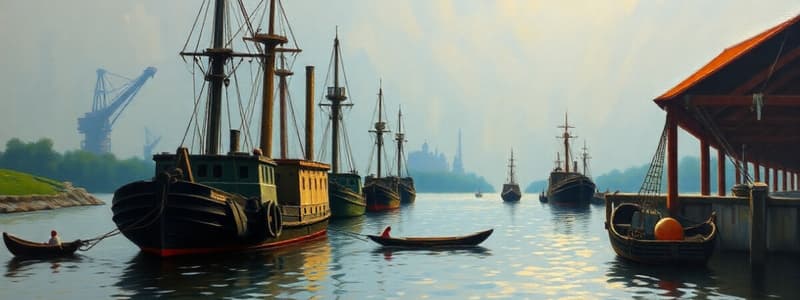Podcast
Questions and Answers
What is one of the primary roles of the International Monetary Fund (IMF)?
What is one of the primary roles of the International Monetary Fund (IMF)?
- To control global commodity prices
- To establish trade barriers in developed markets
- To support developing nations with financial assistance during crises (correct)
- To provide long-term infrastructure projects
The World Bank focuses on short-term financial aid to developing countries.
The World Bank focuses on short-term financial aid to developing countries.
False (B)
What is commodity dependence?
What is commodity dependence?
Reliance on primary commodities exposes economies to price volatility.
Countries like South Korea and Taiwan are referred to as the __________ due to their successful export-led growth strategies.
Countries like South Korea and Taiwan are referred to as the __________ due to their successful export-led growth strategies.
Match the following challenges faced by developing nations with their descriptions:
Match the following challenges faced by developing nations with their descriptions:
What is a key objective of trade policies for developing nations?
What is a key objective of trade policies for developing nations?
Import Substitution Industrialization (ISI) encourages countries to reduce reliance on their own industries.
Import Substitution Industrialization (ISI) encourages countries to reduce reliance on their own industries.
What are the main criticisms of Structural Adjustment Programs (SAPs)?
What are the main criticisms of Structural Adjustment Programs (SAPs)?
Export Promotion focuses on producing goods for _____ by leveraging comparative advantages.
Export Promotion focuses on producing goods for _____ by leveraging comparative advantages.
What is an advantage of Import Substitution Industrialization (ISI)?
What is an advantage of Import Substitution Industrialization (ISI)?
Match the following strategies with their primary focus:
Match the following strategies with their primary focus:
The World Trade Organization (WTO) has mechanisms to support least-developed countries.
The World Trade Organization (WTO) has mechanisms to support least-developed countries.
Name one disadvantage of Export Promotion.
Name one disadvantage of Export Promotion.
Flashcards
Import Substitution Industrialization (ISI)
Import Substitution Industrialization (ISI)
A policy focused on developing domestic industries by discouraging imports and promoting local production, aiming to achieve self-sufficiency.
Export Promotion
Export Promotion
A strategy where countries focus on exporting goods and services to generate economic growth, often with government support for specific industries.
Commodity Dependence
Commodity Dependence
The excessive reliance of a nation's economy on the production and export of a small number of primary commodities, often leading to vulnerability to price fluctuations in global markets.
Lack of Industrial Diversification
Lack of Industrial Diversification
Signup and view all the flashcards
Structural Adjustment Programs (SAPs)
Structural Adjustment Programs (SAPs)
Signup and view all the flashcards
Trade Liberalization
Trade Liberalization
Signup and view all the flashcards
Privatization
Privatization
Signup and view all the flashcards
Fiscal Austerity
Fiscal Austerity
Signup and view all the flashcards
World Trade Organization (WTO)
World Trade Organization (WTO)
Signup and view all the flashcards
Special and Differential Treatment
Special and Differential Treatment
Signup and view all the flashcards
Study Notes
Trade Policies for Developing Nations
- Developing nations face challenges integrating into the global economy due to limited industrialization, reliance on primary commodities, and external shocks.
- Key objectives of trade policies include promoting economic growth and diversification, reducing poverty, and integrating into global trade while protecting domestic industries.
Import Substitution Industrialization (ISI)
- Definition: A strategy to reduce reliance on imports by boosting domestic industries via tariffs, quotas, and subsidies.
- Features: Focuses on producing goods domestically previously imported, heavily reliant on government intervention.
- Advantages: Protects nascent industries, reduces dependency on global markets.
- Disadvantages: Inefficient due to lack of competition, high consumer costs, and limited innovation.
Export Promotion
- Definition: A strategy to boost exports by leveraging comparative advantages and global market integration.
- Features: Encourages export-oriented industries via incentives, subsidies, and infrastructure development.
- Advantages: Accesses larger markets, promotes competitiveness and innovation.
- Disadvantages: Vulnerable to global demand fluctuations, like recessions.
Structural Adjustment Programs (SAPs)
- Implemented by international institutions (IMF, World Bank) to reform economies facing crises or instability.
- Measures: Trade liberalization, privatization, and fiscal austerity.
- Criticism: Negative social impacts like unemployment and reduced services, leading to increased inequality.
Role of International Institutions
- World Trade Organization (WTO): Facilitates trade agreements and dispute resolution for developing nations, offers special provisions for least-developed countries.
- International Monetary Fund (IMF): Provides financial aid during balance-of-payments crises, promotes trade liberalization.
- World Bank: Supports long-term development in infrastructure, education, and healthcare.
Challenges Faced by Developing Nations
- Commodity Dependence: Reliance on primary commodities exposes economies to price volatility.
- Lack of Industrial Diversification: Limited ability to produce high-value manufactured goods.
- Trade Barriers in Developed Markets: Tariffs, quotas, or subsidies in developed countries disadvantage developing nation exports.
Successful Trade Policies
- East Asian Economies (Asian Tigers): South Korea, Taiwan, Hong Kong, and Singapore used export-led growth strategies with government support.
- China's Economic Reforms: Shifted from import substitution to export promotion, leveraged foreign direct investment and global value chains.
Key Insights for Exam Preparation
- Differentiate ISI and export promotion, including their advantages and disadvantages.
- Explain the roles of international institutions (WTO, IMF, World Bank) in supporting developing nations' trade policies.
- Analyze challenges like commodity dependence and trade barriers.
Studying That Suits You
Use AI to generate personalized quizzes and flashcards to suit your learning preferences.




